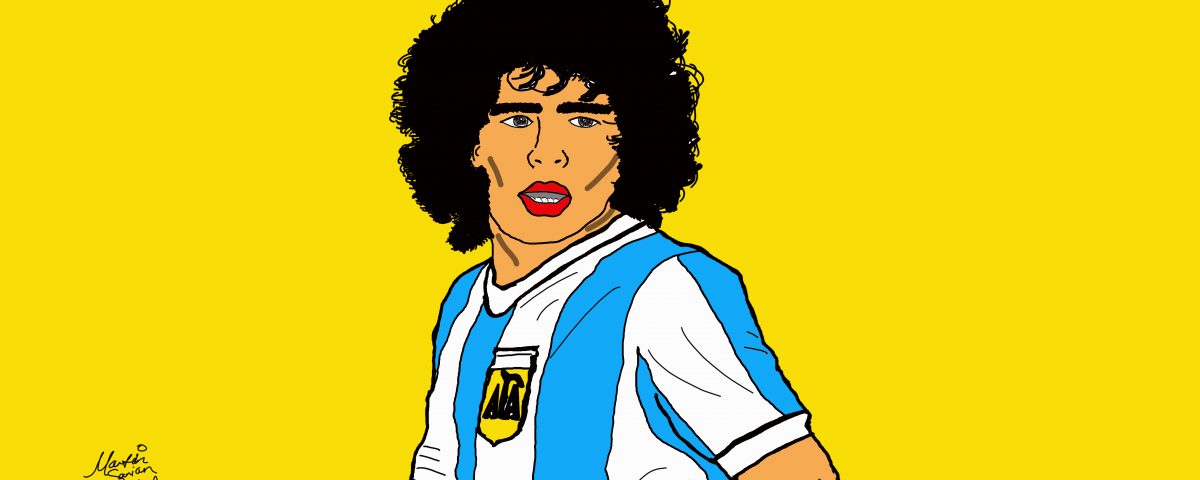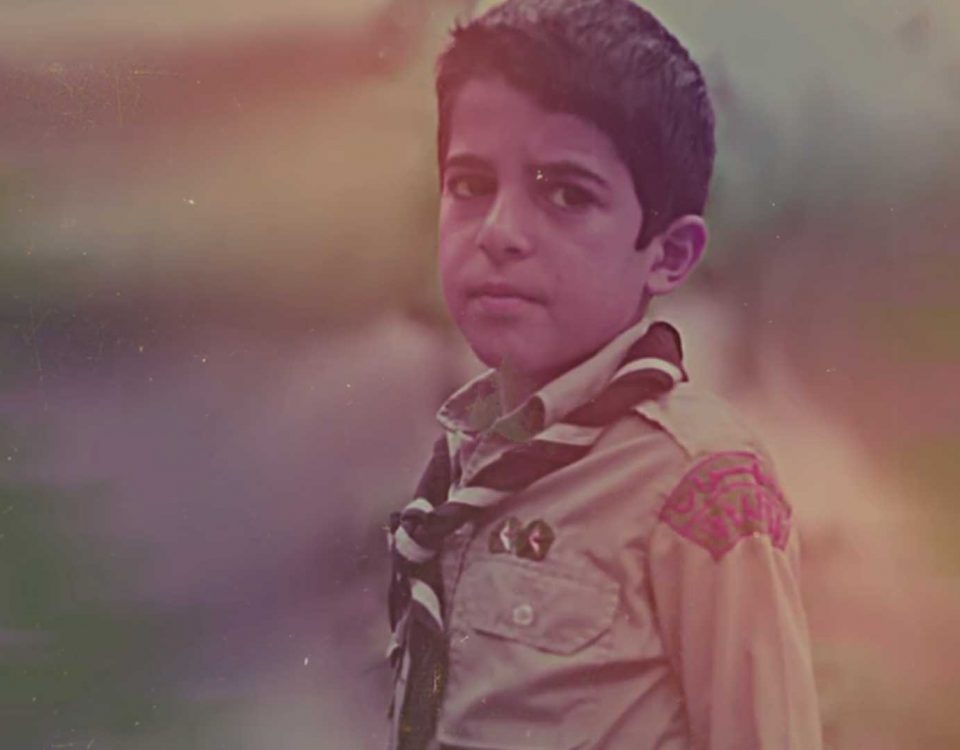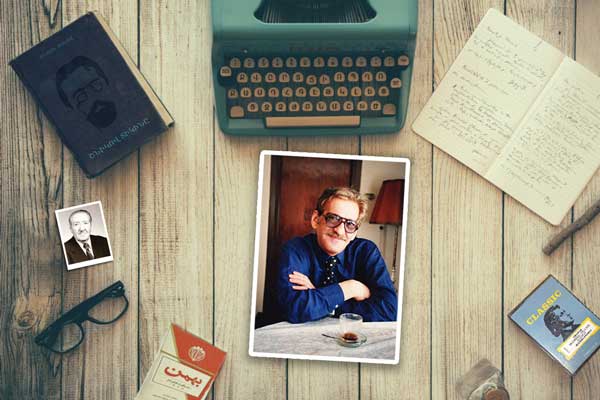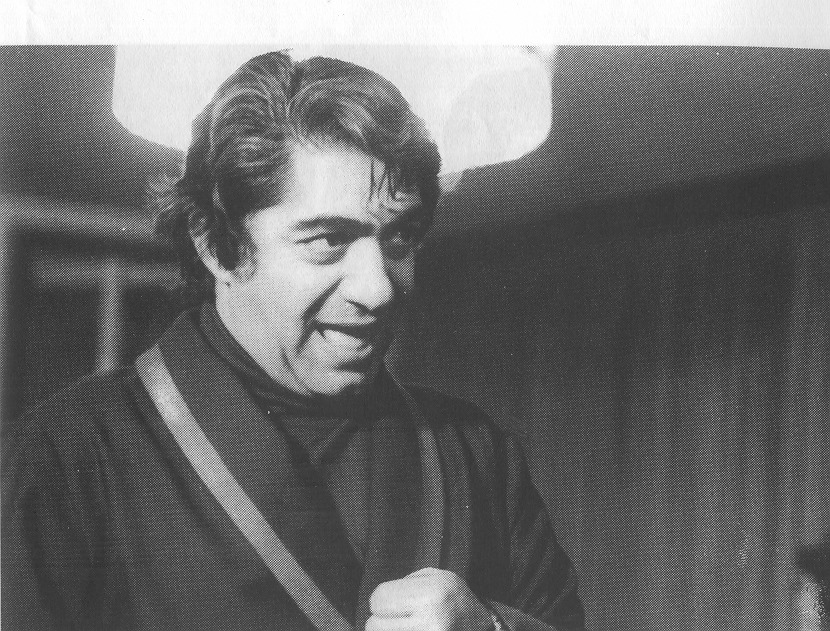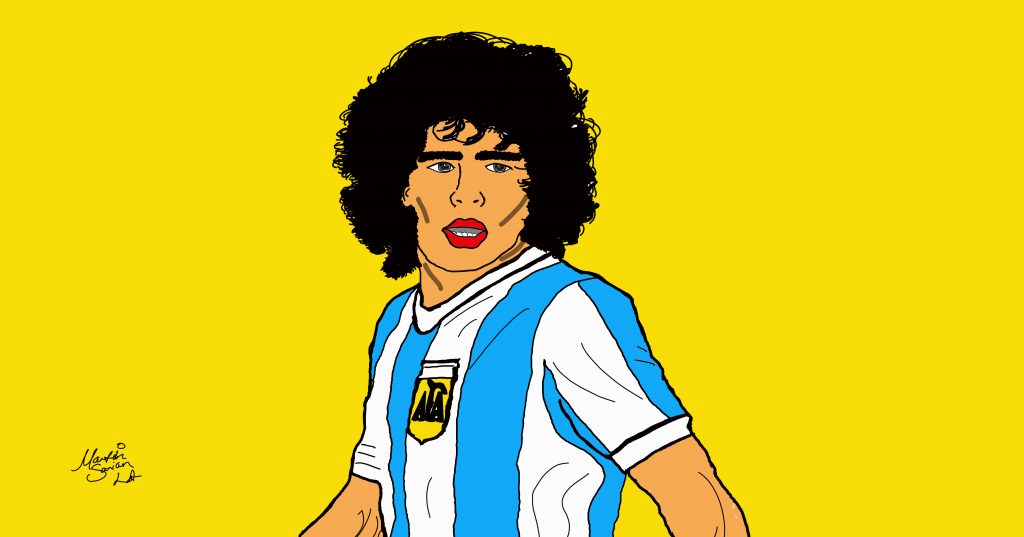
Argentina buried Diego Maradona yesterday. I read here and there, that the world’s greatest football player died last Tuesday of a heart attack at his home in the outskirts of Buenos Aires and that the world is mourning his passing, however in my opinion the Argentinian footballer died long time ago and in fact here in the United States, when the reports coming out of UCLA lab after Argentina’s second game against Nigeria confirmed his use of illegal substances, leading to FIFA banning him from pursuing the most meaningful mission of his life: Winning the football World Cup, again.
In the midst of every possible blow that I personally and collectively as an Armenian individual have suffered this year, Maradona’s passing initially felt like just another punch from the unforgiving year of 2020, but unlike what most of the media capitalized on in the next few days, I thought Maradona wasn’t merely a football prodigy or a controversial athlete… but a symbol of rebellion against injustice who the system wickedly attempted to erase. The most ordinary representation of the word iconoclast, whose departure is also symbolically an embodiment of the end of our struggle, against the pervasive control of the power establishment.
Beside all the amazing moments that the golden boy of Argentina created for generations of football lovers across the world, Diego also stood as the unapologetic figure of the oppressed against the powers who not only control the sports, but the majority of social structures in our world. A figure that represented the kind of a mindset that is uniformly absent in the modern-day celebrity saturated sport culture.
When it comes to standing up for justice, moral or political causes, today’s so-called sports legends, unless mandated from above, avoid risking their public image, bank account and Instagram fanbase for speaking the truth. These corporate army of millionaire celebrities are quick in jumping on the bandwagon of corporate hashtags and social movements, but not a single one of them is bold enough nor smart enough to address the real causes. The greatness of Maradona as a mythical personality is not limited to his brilliance on the pitch, which by all means, will remain unparalleled in the history of football, but in his impulsiveness and righteousness when facing moral dilemmas, whether that be in the midst of a moment in the air or right after the harshest blow of his professional career.
I first saw him on our television set back in 1986, when in a post revolution Iran almost everything was banned on TV except for Mullahs, Japanese sad Cartoons and Football. The World cup in Mexico was the first live broadcasting experience of many people including our family. At nights we would sit at home and stare at the heroes of the biggest show on earth with Zico, Socrates, Platini, Laudrup, Butrogueno and Rummenigge because of whom I became a diehard Germany fan to this day, but it was Maradona who stole the show and the world cup from our hands. I cried and I hated him for his brilliance in leading Argentina into a 3-2 win against Germans in the final match in Mexico, but four years later my new idol Klinsman and Germany made Maradona cry and won the title back during that scandalous night in Rome, after which I barely wore Tshirts without a sign of German football on it.
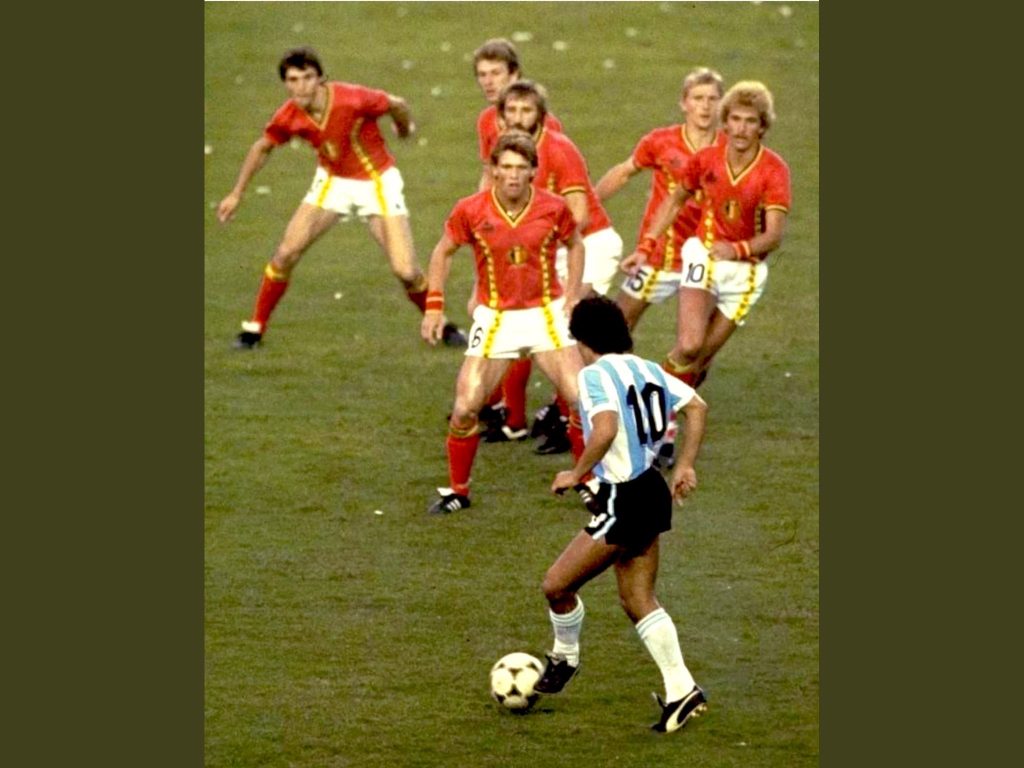
Flashforward to my second year of film school at UCLA, where I had one of those infamous shirts on, to which the Argentinian professor with whom I shared a common love of Sergei Parajanev pointed at with surprise, suggesting that as an Armenian, I should always root for Argentina, since we both stand on the same side against the oppressors… But beside that, because we also shared a common narrative regarding the history of Malvinas and Artsakh regions, the two pieces of land that we believed historically belonged to us yet were forcefully taken away by unjust UN resolutions and occupying regimes. As a result, Maradona’s infamous hand of god moment could not only be regarded as unfair in the mind of anyone from the third world, but in fact was a deserving answer to British for the killing of over 600 Argentinians during 1982 war of Falkland. Since then although I’ve always hold the ground for Germany, when the archetypal rivalry against Albiceleste flares up in a new confrontation, but I could never unsee the fact, that Argentina and Maradona in specific hold a moral high ground in the deeper layers of the international affairs that football, by being the most popular global event, is simply one of the battlegrounds of. And this is particularly so, because unlike the Germans who have usually sided with law and order in the construct of the global power structure, Maradona was the one battling against it. True, the German history is full of eccentric minds such as Martin Luther, Immanuel Kant or Nietzsche and even their cinema is not short of Mavericks such as Rainer Fassbinder and Herzog, but when it comes to football Stefan Effenberg effing their own fans is probably our biggest outlaw. Maradona on the other hand, is a symbol of clash and class conflict. The primary instant goes back to earliest years of his stardom, when a barely 15 years old Diego becomes the top goal scorer of his club Argentinos Junior and receives offers from two of the best clubs in Argentina. River Plate, the club of millionaires representing the affluent community of Bueno Aires offers the teenager a whopping salary and a luxurious life, while their working class archetypal rivals Boca Juniors plunged into an economic crisis struggles to offer him a decent contract. One might expect, that undergoing a life of poverty, the teenage Maradona will not lose the chance of living the dream, but he went with his heart and chose Boca, the team he loved, with a lesser deal, but the aspiration to bring joy for the working class community of immigrants, that he would identify himself with.

His staggering performance in Boca and the wonder goal that he scored in superclasico pawed the way for the biggest European clubs to come after him. Real Madrid, the most affluent team of Spain did their best to sign him a deal, but somehow Maradona ended up signing a contract with their historic rivals Barcelona. Whether class conflict had an impact in 21 years old Diegos decision I don’t know, but to think, that Barcelona’s political struggle for Catalan independence and their underdog stance were irrelevant in his decision is an understatement of Maradona’s worldviews in my opinion.
The crazy kids ego however became larger than his whizzy hair, for which he was nicknamed the fuzz and leading into a famous brawl in the Spanish cup final against Atheletic Bilbao, one that plunged the entire team with Maradona into a gruesome dog fight, which is gathering views on YouTube to this day. Regardless this did not impact his European clients and this time the rich northern Italian clubs came to his hunt. The great north vs South divide in Italy that for me was best embodied in Visconti’s unforgettable Rocco and His Brothers movie, has been transformed into a football medium ever since of all the wealthy teams of the north with tons of glory, Maradona chose Napoli, all the way in the south with zero cups or championship only to fight against the big giants such as Milan, Juventus, Inter and Rome. The poor working-class people of Naples who for years and years had endured disgrace and contempt by losing against those snobbish northern fans could now hit back years of humiliation thanks to Maradona’s magic. The little big man gave them his all and won two Italian league titles, a cup and a European championship. Elevating himself to the level of a saint whose murals and statues are seen to this day in the streets of Naples. It was choices of this nature that cemented his position in the hearts of millions of the poor, not only in Argentina or Italy, but in the most remote places of the world the likes of which can best be seen in Abbas Kiarostami’s “Taste of Cherry” where Maradona’s poster is seen on an Afghan refugee’s wall in the outskirts of Tehran or in “Life and Nothing more” where earthquake struck kids in tents forget about the loss of their family members as they try to install an antenna on top of a hill so they can watch Argentina play against Brazil in the 1990’s second round game.
In the later years Maradona’s siding with the underdogs and criticism of the power took a more political turn as he proudly showed off his fellow Argentinian revolutionary, Che Guevara’s tattooed portrait on his right arm and bragged about his most deadly weapon, well after his sharp tongue, being inked with the image of his favorite Cuban leader Fidel Castro, who according to Maradona was a second father to him.
Throughout the years and while many famous athletes tried to play safe by remaining neutral, Maradona met and supported several left leaning south American leaders. When the Bolivian president Morales resigned in 2019 due to street protests and military intervention, Maradona condemned the power shift as a US backed coup and voiced his support for him. In the same fashion, Maradona also supported Venezuela’s leader Madura during the 2017 anti-government protests by calling himself a Maduro soldier. Venezuela’s previous leader Hugo Chavez was also a Diego favorite. During a weekly state TV program hosted by Chavez himself, Maradona appeared as a guest to voice his support for both Fidel Castro and Hugo Chavez, launching a direct attack towards the US leaders by saying: “I hate everything that comes from the United States. I hate it with all my strength,” his statement followed by calling the US then president George W. Bush a human trash, which was obviously moderated by English-speaking media, was not Maradona’s only attempt at US expansionism, but he ardently campaigned against Bush’s free trade plans in Latin America by wearing shirts that needed not much of a commentary during a national rally in Argentina.
During the 2014 World Cup and as the entire world was tweeting about Germany’s 7-1 win against the hosts Brazil, Maradona condemned the killings of thousands of Palestinians during the siege of Gaza later going as far as openly claiming, that he was a Palestinian at heart. He condemned American intervention in Syria, sent a signed jersey to Ahmadinejad of Iran, praised Russian president Vladimir Putin as a phenomenon who could bring peace to many lives and in fact his last interview reveals that he trusted the Russian president to be the one introducing vaccines that would put an end to Covid19 pandemic. His actions were obviously closely followed by the American authorities and a quick search in Wikileaks reveals confidential communication that address his public image and potential to impact large public opinion.
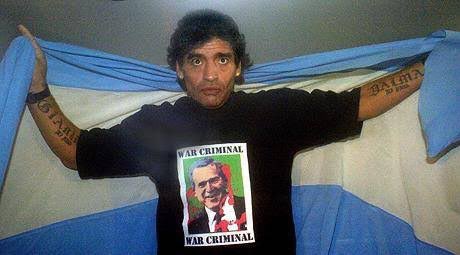
However, whether we agree or disagree with his politics is not the point here, but the fact that with Maradona’s death voices of this nature will seize to exist and its not a certain ideology or political group that has to worry about this, but all those who believe in the right of unrestrained and free expression of thoughts.
What Maradona said and who he sided with is meaningful, but I think it comes secondary to the fact that given the wide use of internet and popularity of social media, having access to platforms of expressing ideas in today’s world is simply a basic human right, yet the way our culture is being shaped, that basic freedom is becoming extremely scarce day by day, partly because of the sense of self censorship that we apply to ourselves and partly because we are entering an age that was best described in J>D’s paper called soc. According to JDL we:…… In order to understand this, compare the list of authorized social activities that today’s celebrity sportsmen do with the kind of impulsive criticism, that Maradona shouted out during his lifetime and maybe that could explain why his persona was much more larger than the size of the football fields that the majority of media is trying to keep him in.
Like every other corporate celebrity he was espoused to entertain us, excite us and keep us glued to our screens between the commercials like a typical Bread and Circus gladiator, but Maradona decided to revolt and deliver unconventional messages. Things that those who run the show do not need us to know. Things that only few who are bold enough, smart enough and popular enough to make a change have been able to express (Brando video)
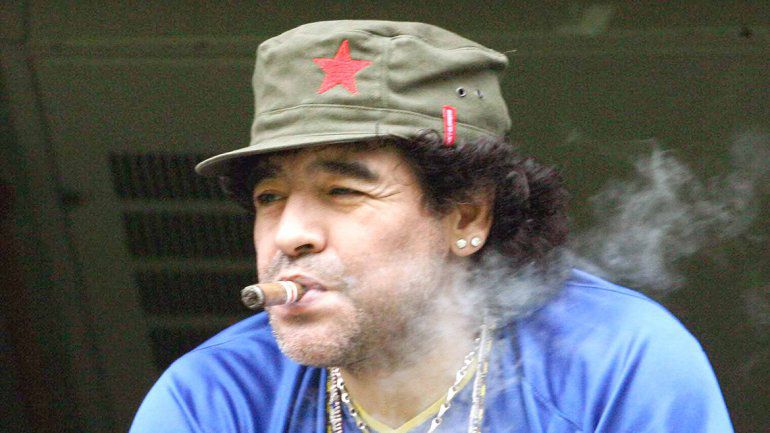
But they used his flaws to to discredit him and wasn’t too hard. It is difficult to see that behind the selfish and irresponsible image, that the mainstream media drew of him, there was a man who refused to bow down to those who thought he could have been bought by fame, money or complicated contracts.
Many of the issues that he called out were deemed as naive and immature, because of his unrestrained character and childlike personality, but in a world that adults nervously and constantly calculate the weight of their every statement and the impact of every single word, tweet or even like, we needed Maradona to tell us more often than not, that the emperor has no cloths.
His long-lasting feud with the highest governing body of world football, FIFA and its corrupt Brazilian leader Jeo Havelanj was perhaps his greatest battle, which as I mentioned in the beginning resulted to his demise, but it also revealed the true face of the establishment within the boundaries of the free world. And by the free world I certainly do not mean the English speaking media sphere, where so little is said or written about this case, leaving the average English speaker absolutely clueless about what exactly took Maradona away from face of the international football in the middle of the 1994 US World Cup.
Maradona was made to shine on the scene of the world’s greatest event, The Football World Cup. His every move during those 21 memorable games of the four world cups that he graced billions of viewers over the span of 12 years was a divine stroke of an artist’s brush on a green grass canvas. As dramatic as a Caravaggio painting, as rhythmic as a Mozart melody, as poetic as a Forough verse and as captivating as a Callas performance and just like all of them, Maradona’s impact was more about his instinctive genius than a planned precision, a true touch of god with a potential to change things all by himself.
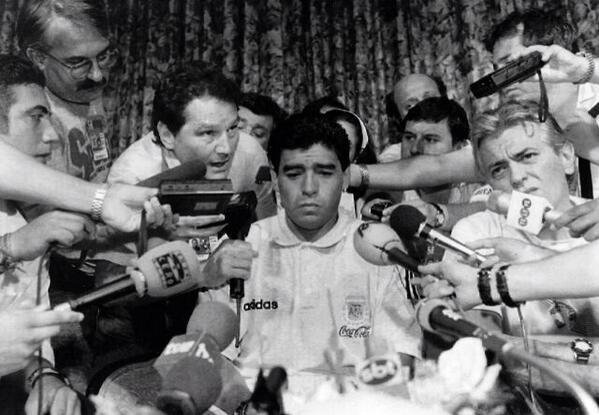
But the system doesn’t like surprises, the system wants to be on top of things, the system wants to maintain control, in order to survive the system needs to be ahead of us, it needs to know our next step so it can contain us, (J. Tatti scene) Maradona was the opposite, he was uncontrollable, uncontrollable in the pitch, uncontrollable in his interviews, uncontrollable in ceremonies, And uncontrollable in his politics…
So when the uncontrollable 21 years old tournament was cut short because of a red card that he received for kicking a Brazilian in the nuts at 1982 in Barcelona, it meant, that optimistically looking, he would still have 3 more World Cups ahead… And so, four years later as the team’s captain, he won the world cup for Argentina in Mexico with a solo performance, the highlights of which were two historic goals against England, two stunners against Belgium and a golden pass that led to a dramatic win against my dear Germany in the final. His one man show in Mexico proved the individual impact of his genius as he singlehandedly carried an average Argentina to the top of the world. Four years later Maradona came back to Italy to defend their title, but his side was out of tune, yet thanks to his leadership and an accident called Goicoechea, they managed to reach semifinals against the hosts Italy only to eliminate them in a thrilling penalty shootout in front of their infuriated Tifusi fans. The impoverished southern Italians who worshipped him like a god turned against him over night. (Et toi Brutus) Maradona who expected the Naples fans to be on his side against Germany on the final match was stunned to see Italians booing the Argentina national anthem from the start. So he said, what he had to say in return. With several injured and suspended players his team showed little intensive to win against the revengeful Germans, but it was most of all Edgardo Codesal, the Mexican referee who Maradona was mad at. In the 85th minute of the game, he favored Germans with a controversial penalty that was placed in the back of Argentina’s net by Andreas Brehme, ultimately crowning the Germans their third world cup. This penalty and the two red cards that relegated Albiceleste’s down to nine men flared up Maradona to accuse the referee of “a robbery” orchestrated by FIFA, directly blaming Havelanje for arranging things in a way that no other South American team could win the World Cup in European continent during his reign at FIFA. The table was tilted and the game was rigged (Carlin) He lamented… A tearful Maradona refused to shake hands with Blatter and Havelange during the final ceremony and made millions of his fans to cry with him throughout the entire world.
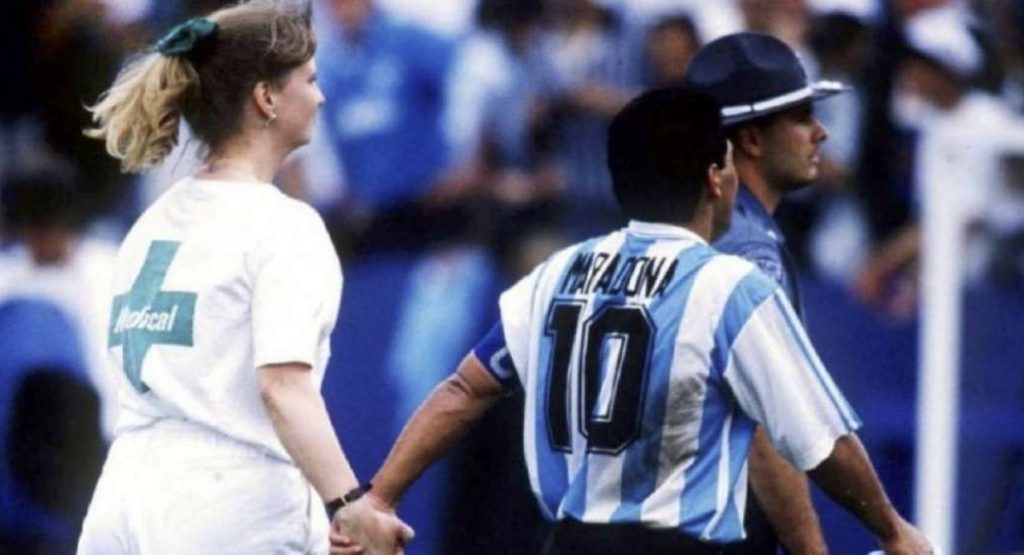
For the next four years Maradona barely conducted an interview, without accusing Havelange and FIFA of corruption while at the same time drowning himself into drugs and misconduct that opened the door for FIFA to ban him from professional football for 15 months. Given his age he now had only one world cup left to realize his lifetime dream and a mountain of setbacks to make it into the Argentinian squad including his weight and cocaine addiction, but an invitation from Fidel Castro took him out of the sunken place and put him in the right track. He travelled to Cuba to undergo rehab and lose weight where he also had frequent conversations with the old revolutionary and eventually came back on time and fit as a fiddle, thanks to Fidel, to help endangered Argentina reach the 1994 world cup in the US, his final chance to raise the cup for one last time.
The first two games in the group were a glowing testament of Maradona’s successful return as his stunning collaboration with the golden generation of Argentina’s football promised a third championship, but things suddenly fell apart in Boston when after the game with Nigeria a nurse stepped into the field out of the blue and demanded Maradona, of all other players to conduct a doping test. What followed was a disturbing series of events that to this day is a topic of controversy in football world. Maradona whose intent to make a comeback was best seen in his vengeful body language after scoring a goal against Greece was accused of having a cocktail of drugs in his system. The second report coming from UCLA within 24 hours confirmed unlawful dosage of ephedrine and FIFA quickly voted him out of the competition, putting the football world in shock and the Argentinian team in a complete disarray. The president of the Argentinian football federation Julio Grondona, swiftly collaborated with FIFA in removing Maradona from the camp before their third game with Bulgaria, however Maradona insisted on having a press meeting to explain himself. (Video) Despite persisting to be innocent and claiming to be unaware of any illegal substance use, other than what the team doctor had prescribed for him, Maradona was pushed to leave the US with the first flight. A disoriented Albiceleste, as a result lost their next two games and were out of the competition in a sheer chaos, which pawed the way for the not terribly talented Italy and Brazil to conduct a goalless final in Rose Bowl, Pasadena leading to a penalty shootout, that saw Brazil as the winner.
And so the world witnessed the US then Vice President Al Gore handing the world cup to Brazilian captain, as Blatter and Havelange clapped the success of their achievements. Only a mind with a full understanding of Maradona’s capabilities, the global politics and worldwide popularity of football can imagine what scenarios could unfold had an uncontrollable Maradona been able to reach that same spot that the Brazilian captain Dunga was standing.
It goes without saying that having an uncontrollable maniac, raising the world cup on American soil during the most viewed event of the world, while the American leaders were clapping for him could have led to the most disastrous PR meltdown for the United States in history, the impact of which would have travelled much further than the highly politicized match of the century in Reykjavik, between the American Bobby Fischer and Russian Boris Spassky in 1972 or the entire space race between the two superpowers of the cold war era. In this case, a global icon of antiestablishment, who had spent months with Fidel Castro, the most celebrated critic of the US and a global champion of anti-imperialism, were to rise the World Cup in America, the only superpower of the planet! And if you thought that Maradona would let this opportunity go out of hand, then you obviously don’t know him.
What happened behind the curtains after the game against Nigeria was not easy to understand. The forces that removed Maradona from the picture were powerful people at that time. Besides occupying principal roles in the highest positions of their respective federations, Grondona, Blatter and Havelange were also fierce businessmen who had strong ties with major global marketing firms and were involved with illegal fund transfers across continents. To go against their narrative meant to jeopardize one’s own position and in some cases safety. As a result the media conveyed the inscribed narrative and no one spoke up against it except for Maradona himself who was entirely subdued, since on top of being a cheat, he was also labeled as a frantic noisemaker with a history of drug and alcohol abuse. It was only recently and after the death of Havelanje and Grondona, that the news of their organized corruption, bribery and racketeering was publicized, leading to more accusations against Blatter, that eventually led to his resignation as FIFA president. The new revelations inspired Argentina’s then coach Alphio Bazil and Maradona’s playmates to disclose new evidence, that proved the whole Doping accusation to be a scam.
In a recent interview with Argentinian sports channel TYC the head coach of the national team describes that he had taken a surprise antidoping test from all players already and every single one of his players including Maradona were clean. In this interview Basil, a veteran and popular Argentinian sports figure blames Havelange for screwing Argentinians unlawfully. Oscar Ruggeri, another Veteran Argentinian player who replaced Maradona as the captain upon his removal also recently claimed in another interview, that the entire doping scandal was a scam to keep Maradona and Argentina away from the final. According to Ruggeri, Grondona follows Havelange’s orders to save his own face. In another May 2020 interview, the respected Argentinian striker Abel Balbo, also a Maradona teammate describes the events of the 1994 World cup a complete scam: ” Everything that happened with Diego was a boycott, Argentina bothered them and they could not allow us to be world champion especially with Maradona as a captain . It was all very strange, Diego was always very sincere with us, he was doing things well. “The way in which all that outcome took place is also what makes Balbo doubt how that story happened: “How they went to look for him and led him by the hand, they put up a whole show. It was the only time in history that A nurse goes to look for a player on the pitch. Later, and as time went by, they accepted that everything was quite dirty at FIFA, ”

